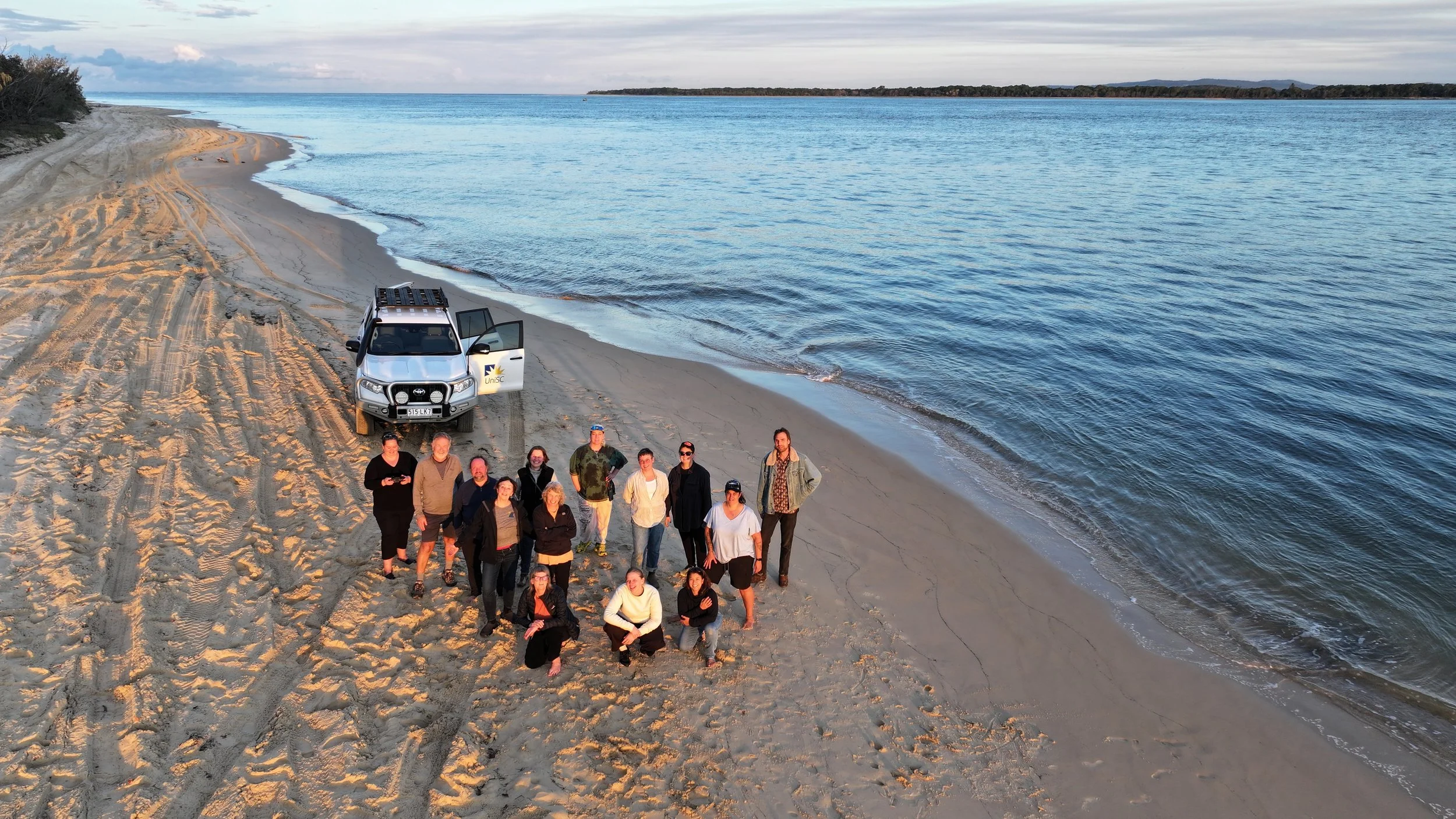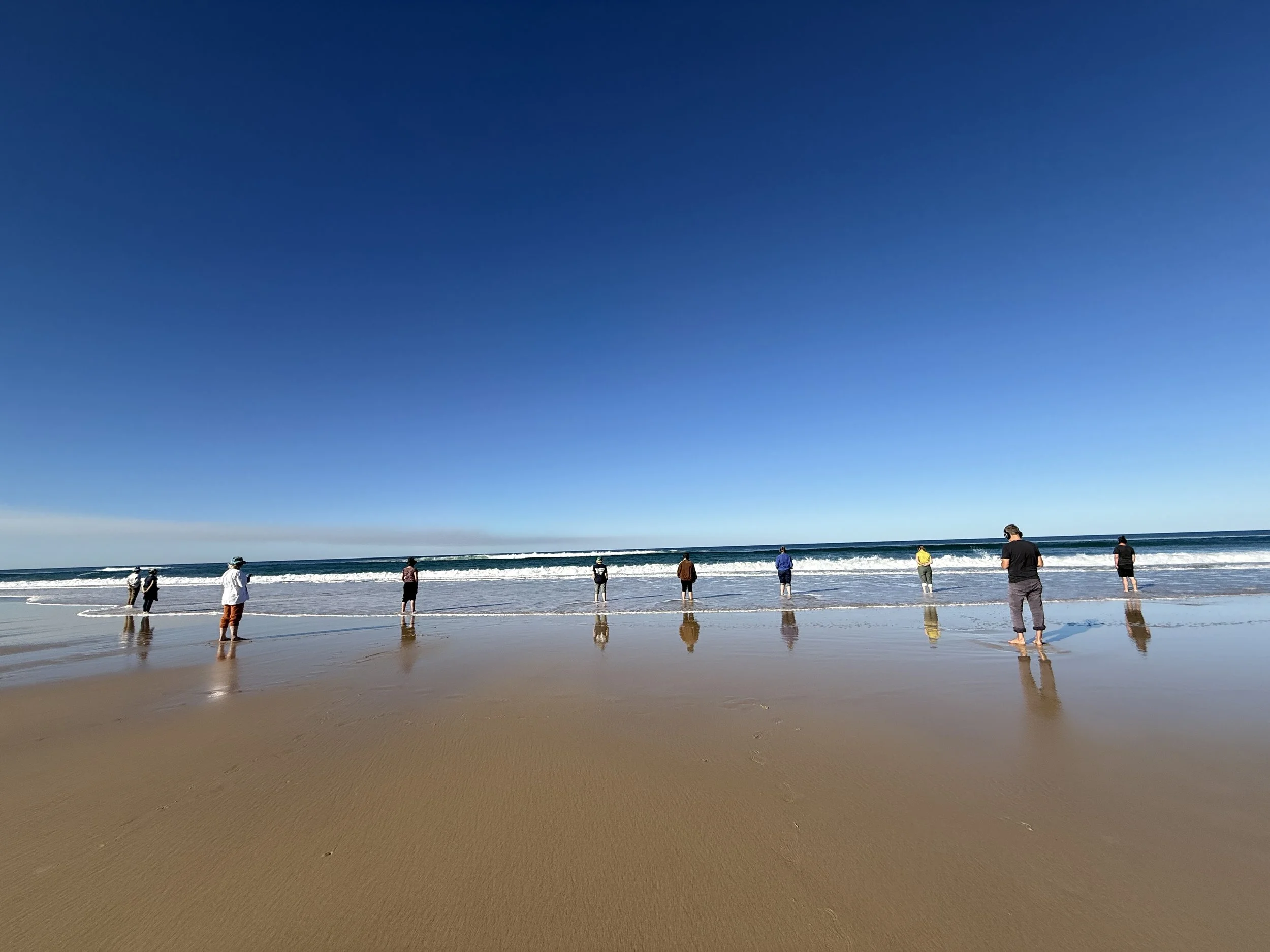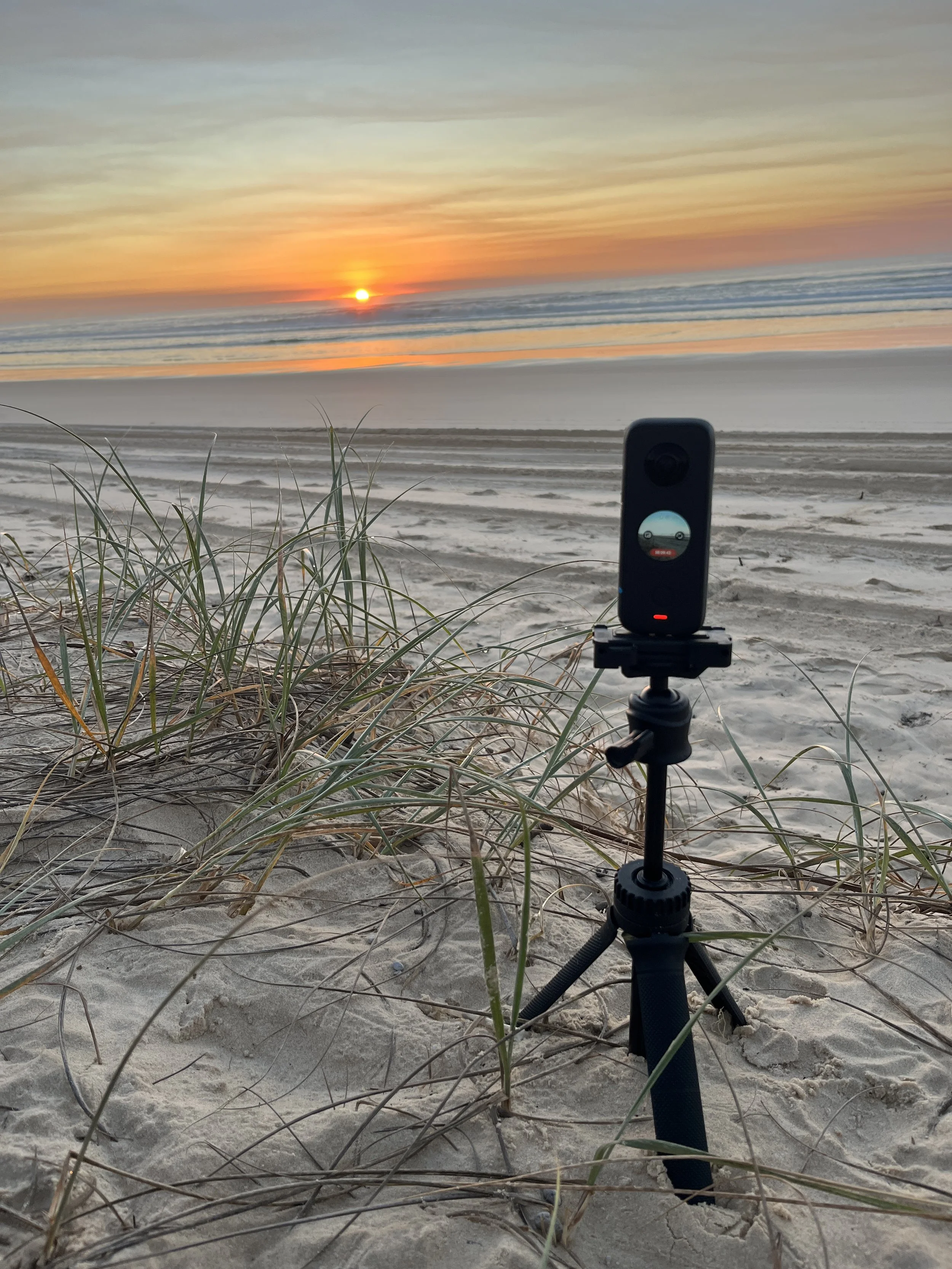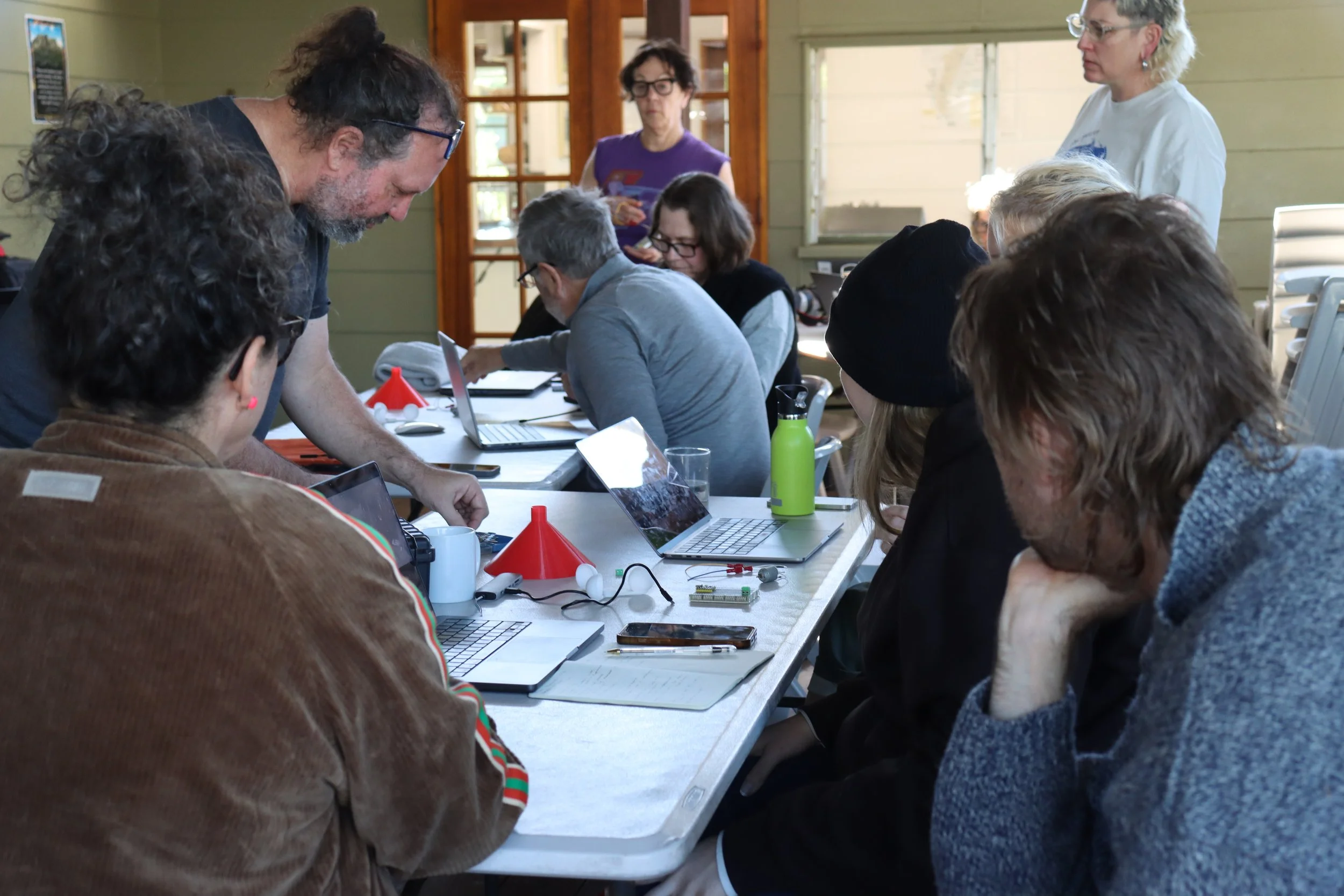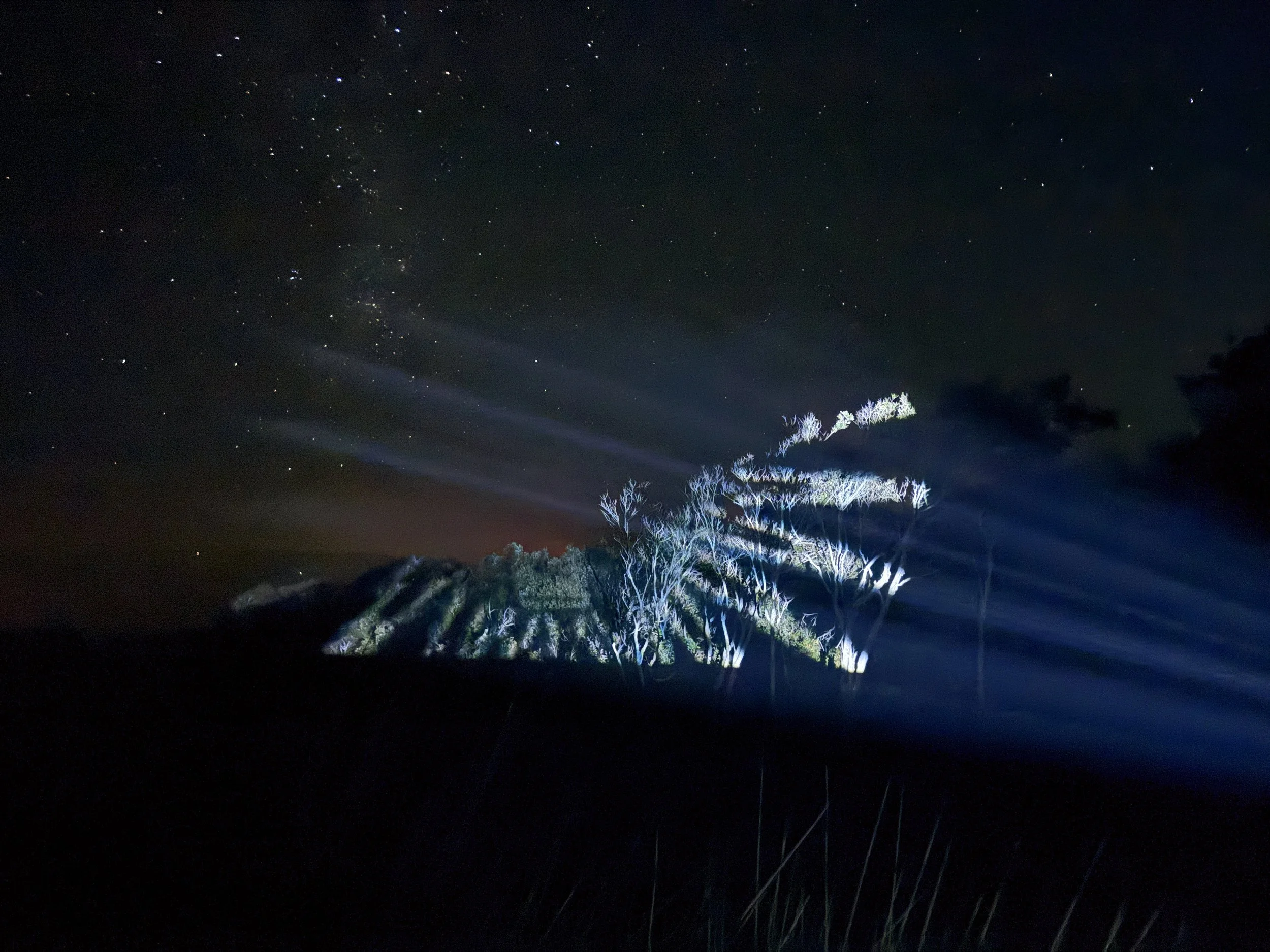K’gari Field Trip 2025 - Immersion in Place, Practice and Technology
The opportunity to step away from daily life and take a field trip with a group of technologically-engaged artists from all over Australia was fully embraced by the nine participants attending the 2025 K’gari Field Trip. Now in its second year, this epic 4-day, 3-night immersion amidst the beauty of World Heritage K’gari is designed to allow space for artists to listen deeply, connect to Country, build skills and apply new technologies in their creative practices.
Delivered by The Refinery in partnership with the University of the Sunshine Coast (UniSC), the K’gari Field Trip is a signature program and a collaborative, place-led laboratory for experimental art making, reflection and interdisciplinary exchange.
On the barge crossing from Rainbow Beach to K’gari, a pod of dolphins greeted the group, setting the scene perfectly for the adventures ahead. Upon arrival to the island, participants stood on the water’s edge in wireless headphones, looking out over the vast ocean, listening to the welcome and words of Butchulla Elder Aunty Joyce Bonner layered into a live mix of field recordings by Leah Barclay. Later, at the Research Station, Aunty Joyce telephoned to formally welcome the group and share stories of the island, from the birthing places in local creeks to her work through song to keep Butchulla language alive through the generations. Her advice to the group was to let K’gari take the lead and remain open to receive its inspiration.
“Sometimes you’re led to a place for a reason,” Aunty Joyce reminded the group “Keep listening to what Country is telling you”.
After a stunning sunrise on day 2, a morning workshop from artist Marian Tubbs challenged participants to let go of creative habit as they set about the Dilli Research Station playfully experimenting with 3D scanners, 360 cameras and zoom recorders to create their own assemblaged works. Encouraging the ‘smashing of things together’, the workshops asked artists to detach from their aesthetic preferences and to test their own value systems to make space for creative discovery beyond taste.
In visits to Central Station and Boorongarra (Lake MacKenzie), artists further explored this way of thinking amongst the aesthetic beauty of these places, using hydrophones to tune in to the underwater sound of crystal clear creeks and hollowed out fallen trees, sounds that are beyond the norms of singing bird chorus and trickling water.
Technical skill building was the focus of the workshop program on the third day, with teams of artists building wind sensors as inputs into TouchDesigner under the guidance of Dr Toby Gifford, transforming environmental data into live visual and sound compositions and an ecoacoustics workshop with Dr Leah Barclay, profiling the range of technologies and strategies for capturing sonic ecologies. With time to then take these skills and apply them in the field, artists worked within and around the environs adjacent to the Research Station or along the K’gari Great Walk, deeply listening and recording in the field. A sunset drone session on the beach captured sharks and a whale and calf cruising the ocean waters, whilst a Wongari (Dingo) was spotted in the creek nearby. Projections of the day’s captures and experiments were then projected on reed beds in the nearby creek and across the walls of the research station, as a way of reflecting on the day and in celebration of new skills and footage captured.
The final day was an opportunity for a workshop on vibe coding by Toby Gifford and allowed groups to consolidate new skills in more site visits to Boorangoora, the rust coloured Lake Boomanjin, and inland towards the western side of the island. Artists experimented with listening and creating field recordings using zoom recorders and bi-aural microphones, set ups for 360 camera shots, and photo and video drone capture, above and beneath the surface.
Not wanting to leave, the group reluctantly packed up to catch the last barge off the island, spotting whales along the way as the convoy of vehicles drove along the beach and towards the last of the sunset.
The K’gari Field Trip continues to evolve as a model for place-based artist development, inviting artists to observe, listen and unsettle their assumptions and experiment with practice that is more responsive, respectful, and more deeply rooted in place and respect for Country.
Thank you to the artists who joined the trip, Anna Munster (NSW), Andrew Styan (NSW), Felix Cehak (Qld/NSW), Georgia Haywood (Qld), Kellie O’Dempsey (Qld), Lisa Kurtz (Qld), Marion Tubbs (NSW), Michelle Barker (NSW) and Yandell Walton (Vic).
Special mention to Nooks and Cooks catering for their extraordinary meals infused with bush tucker and for keeping the group nourished for four days of experimentation.
Thank you to our partners in the Creative Ecologies Research Cluster at UniSC, in particular Dr Leah Barclay, Dr Toby Gifford and Megan Williams and students Janine Fuller and Marcia Grimm.
Images courtesy of Leah Barclay, Marcia Grimm and Toni Wills.
R|Short Program: K’gari Field Trip is presented by SCCA through The Refinery in partnership with the Creative Ecologies Research Cluster at UniSC.
Supported by Major Partners, Queensland Government through Arts Queensland, Sunshine Coast Council through the Regional Arts Development Fund, and Media Partner IN Publishing (Hello Sunshine Magazine and In Noosa Magazine).
Sign up for updates and be the first to know about our upcoming programs.


